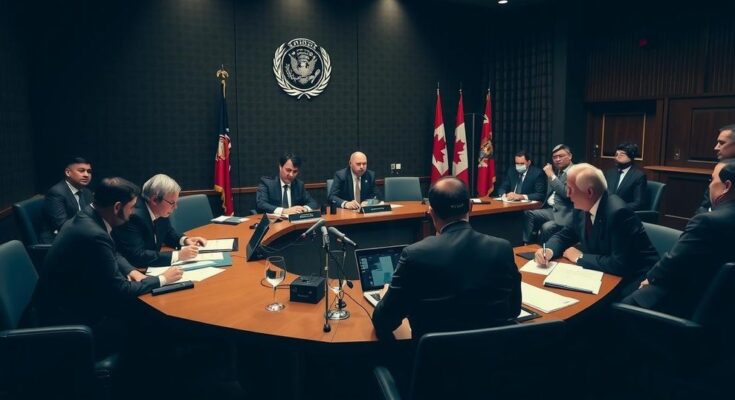COP29 negotiators are working to resolve a financial stalemate following G20 leaders’ acknowledgment of necessary climate funding for developing nations. The conference faces critiques over vague commitments on climate finance and fossil fuel transition, with emerging drafts expected soon. Key discussions hinge on the balance of responsibilities between developed and developing nations, particularly regarding the sources of climate funding and adherence to previous agreements.
Negotiators are engaged in critical discussions at COP29, striving to resolve a stalemate following the G20 leaders’ meeting in Rio de Janeiro, which acknowledged the necessity of significant financial support for developing nations but left unresolved pivotal issues. With the conference drawing to a close, the G20 statement was seen as a potential catalyst for renewed dialogue, despite criticisms regarding its vagueness on climate financing and the lack of explicit measures to phase out fossil fuel dependency. Lead negotiator Yalchin Rafiyev of Azerbaijan remarked on the G20 declaration’s positive implications for negotiations, while UN climate chief Simon Stiell emphasized the urgency for nations to progress towards common ground. The call for deeper commitments, particularly from wealthier countries, is underscored by President Luiz Inacio Lula da Silva of Brazil, who highlighted the importance of advancing the agenda in Baku ahead of next year’s conference. Discrepancies regarding the formulation of climate finance commitments remain contentious, with proposed figures falling short of developing countries’ expectations. Some nations advocate for an annual figure of $1.3 trillion, while developed states face financial constraints that precipitate a reliance on private sector involvement. Additionally, Saudi Arabia’s reluctance to endorse previous pledges to decrease fossil fuel reliance has hindered progress. EU envoy Wopke Hoekstra emphasized the necessity of adhering to prior agreements to ensure successful outcomes. Negotiators anticipate a new climate finance draft by Wednesday night, yet clarity on funding sources and commitments remains imperative to address global climate challenges effectively.
The COP29 conference, occurring in Azerbaijan, represents a pivotal meeting in the ongoing global efforts to address climate change. As negotiations unfold, they are influenced significantly by the outcomes and declarations from the recent G20 summit, which addressed the financial needs of poorer countries in combating climate impacts. Financial commitments, particularly from developed nations, are critical to ensuring that developing countries can mitigate and adapt to climate change while transitioning to sustainable energy sources. Established precedents from prior COP meetings impact current discussions, especially concerning fossil fuel dependence, financing structures, and the roles of various nations in contributing to climate solutions.
In summary, as COP29 negotiators seek to finalize a climate deal, they face challenges primarily rooted in financial commitments and the reluctance of certain nations to commit to phasing out fossil fuels. The G20 summit provided a framework, yet lacked decisive directions that could have alleviated tensions and provided a clearer path forward. With critical negotiations ongoing, the upcoming draft on climate finance will be pivotal in determining the conference’s success and the broader goals for climate action moving forward.
Original Source: www.rfi.fr




